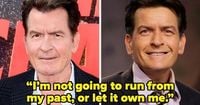Charlie Sheen, the actor whose name became synonymous with Hollywood excess and tabloid headlines in the early 2010s, is once again capturing public attention—this time, on his own terms. With the release of his memoir, The Book of Sheen, on September 9, 2025, and a two-part Netflix documentary, aka Charlie Sheen, premiering the very next day, the 60-year-old star is laying bare the most intimate, tumultuous, and misunderstood chapters of his life. The revelations are as candid as they are headline-grabbing, but for Sheen, the process is less about shock value and more about liberation.
In a series of interviews leading up to the release of his tell-alls, Sheen has spoken openly about a period in his life marked by drug addiction, sexual exploration, and ultimately, personal reckoning. According to People, Sheen described the act of finally sharing his story as "fucking liberating... [to] just talk about stuff. It's like a train didn't come through the side of the restaurant. A fucking piano didn't fall out of the sky. No one ran into the room and shot me." For an actor whose every move was once scrutinized by the world, the relief in his voice is almost palpable.
One of the most striking admissions in both the memoir and the Netflix documentary is Sheen's acknowledgment of his sexual encounters with men—a subject he had never previously addressed in public. He traces these experiences back to a chaotic phase of his life dominated by crack cocaine use. "That's what started it," Sheen told Good Morning America. "That's where it was born, or sparked. And in whatever chunks of time that I was off the pipe, trying to navigate that, trying to come to terms with it—'Where did that come from? Why did that happen?'—and then just finally being like, 'So what?' So what? Some of it was weird. A lot of it was fucking fun, and life goes on."
Sheen's frankness is a far cry from the secrecy and shame that once surrounded these aspects of his life. He admits that, for years, he paid people off to keep his private life out of the public eye. "At the time I was just like, 'All right, let's just pay to keep it quiet,' and just hope it just stays over there," he explained, referencing threats of blackmail involving videos and personal information. The actor revealed that people staying overnight at his home would take photos of his medication and use it to extort him. "I was kind of held hostage," he told People. Eventually, Sheen made the difficult decision to go public with his HIV status in 2015, famously announcing it on the Today show. "I do know for a fact that I never passed it on," he stated, adding that the disclosure was a turning point in his life.
Sheen contracted HIV during the same period of intense drug use and sexual experimentation. The diagnosis, which initially filled him with dread—he feared he had a brain tumor—ultimately forced him to confront his own mortality and the consequences of his choices. In his memoir, he describes the moment as a "turning point," one that led him to pay millions of dollars to "unsavory" people who threatened to reveal his status. Despite the trauma, Sheen insists, "I'm not going to run from my past, or let it own me."
The Netflix documentary and memoir are not simply exercises in confession. They also chart Sheen's journey toward sobriety and self-acceptance. Now eight years sober, the actor credits his former drug dealer, Marco, with playing a pivotal role in his recovery. In a conversation with Variety, Sheen recounted how Marco began substituting baking soda for narcotics, helping him wean off drugs in a way that, in Sheen's words, was "kind of the moon landing of a solution inside of that insanity." It wasn't a conventional path to sobriety, but, as Sheen puts it, "it just made sense to give that a shot."
Sheen's personal life has been as storied as his career. He has been divorced three times and is the father of five children. The actor's infamous "tiger blood" tour in 2011—marked by erratic interviews and public meltdowns—remains a cautionary tale of celebrity excess. Looking back, Sheen expresses regret about that period. "That tour didn't have to happen. I'm not a victim, but somebody should have tapped out for me and said, 'This is a bad idea.' I've combed through all the mental health manuals, and I've never found 'exploitation' as a good treatment protocol," he told People.
As Sheen reflects on his life, he is also attempting to rebuild relationships that were strained or broken during his years of addiction and turmoil. He mentions reaching out to his former Two and a Half Men co-star Jon Cryer, who spoke compassionately about Sheen in the documentary. "I'm thinking I wrote to the wrong number. It's not like Jon to not respond. He's super responsible like that. So if you're reading this, Jon, DM me your new number!" Sheen joked.
Throughout his recent interviews, Sheen has made it clear that his goal is not to rewrite history or paint himself as a victim. "It's not about me setting the record straight or righting all the wrongs of my past," he said. "It's just me, finally telling the stories in the way they actually happened. The stories I can remember, anyway." He acknowledges the pain he caused others and the pain he endured, but insists that his new-found openness is about owning his narrative, not seeking pity.
For those who have followed Sheen's tumultuous journey, the new memoir and documentary offer a rare glimpse behind the curtain—a chance to hear his story, unfiltered and unapologetic. As the world tunes in to aka Charlie Sheen and leafs through The Book of Sheen, it's clear that, for better or worse, Charlie Sheen is determined to live the rest of his life without secrets or shame. It's a bold move in an industry that often thrives on myth and mystique, but for Sheen, it seems, the truth is finally enough.


